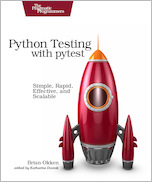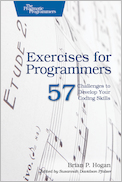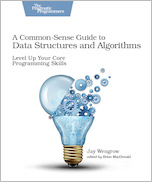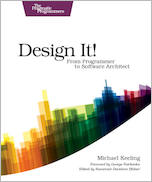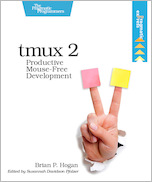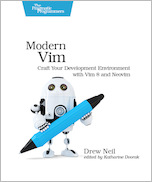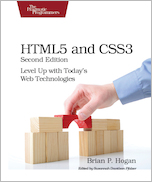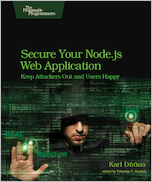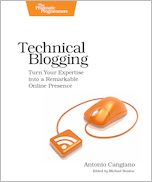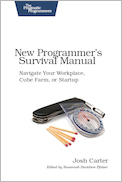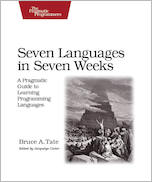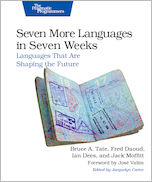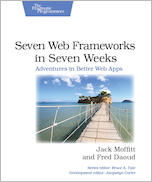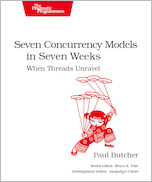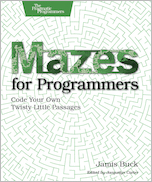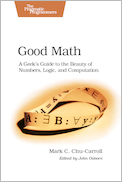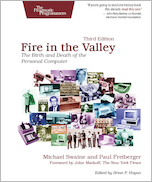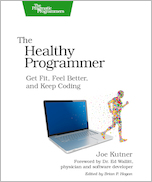Python Testing with pytest
Do less work when testing your Python code, but be just as expressive, just as elegant, and just as readable. The pytest testing framework helps you write tests quickly and keep them readable and maintainable—with no boilerplate code. Using a robust yet simple fixture model, it’s just as easy to write small tests with pytest as it is to scale up to complex functional testing for applications, packages, and libraries. This book shows you how.
Brian Okken
(220 pages) ISBN: 9781680502404 $43.95
Exercises for Programmers
When you write software, you need to be at the top of your game. Great programmers practice to keep their skills sharp. Get sharp and stay sharp with more than fifty practice exercises rooted in real-world scenarios. If you’re a new programmer, these challenges will help you learn what you need to break into the field, and if you’re a seasoned pro, you can use these exercises to learn that hot new language for your next gig.
Brian P. Hogan
(118 pages) ISBN: 9781680501223 $24
A Common-Sense Guide to Data Structures and Algorithms
If you last saw algorithms in a university course or at a job interview, you’re missing out on what they can do for your code. Learn different sorting and searching techniques, and when to use each. Find out how to use recursion effectively. Discover structures for specialized applications, such as trees and graphs. Use Big O notation to decide which algorithms are best for your production environment. Beginners will learn how to use these techniques from the start, and experienced developers will rediscover approaches they may have forgotten.
Jay Wengrow
(218 pages) ISBN: 9781680502442 $45.95
Design It!
Don’t engineer by coincidence—design it like you mean it! Grounded by fundamentals and filled with practical design methods, this is the perfect introduction to software architecture for programmers who are ready to grow their design skills. Ask the right stakeholders the right questions, explore design options, share your design decisions, and facilitate collaborative workshops that are fast, effective, and fun. Become a better programmer, leader, and designer. Use your new skills to lead your team in implementing software with the right capabilities—and develop awesome software!
Michael Keeling
(358 pages) ISBN: 9781680502091 $41.95
tmux 2
Your mouse is slowing you down. The time you spend context switching between your editor and your consoles eats away at your productivity. Take control of your environment with tmux, a terminal multiplexer that you can tailor to your workflow. With this updated second edition for tmux 2.3, you’ll customize, script, and leverage tmux’s unique abilities to craft a productive terminal environment that lets you keep your fingers on your keyboard’s home row.
Brian P. Hogan
(102 pages) ISBN: 9781680502213 $21.95
Modern Vim
Turn Vim into a full-blown development environment using Vim 8’s new features and this sequel to the beloved bestseller Practical Vim. Integrate your editor with tools for building, testing, linting, indexing, and searching your codebase. Discover the future of Vim with Neovim: a fork of Vim that includes a built-in terminal emulator that will transform your workflow. Whether you choose to switch to Neovim or stick with Vim 8, you’ll be a better developer.
Drew Neil
(190 pages) ISBN: 9781680502626 $39.95
HTML5 and CSS3 (2nd edition)
HTML5 and CSS3 are more than just buzzwords – they’re the foundation for today’s web applications. This book gets you up to speed on the HTML5 elements and CSS3 features you can use right now in your current projects, with backwards compatible solutions that ensure that you don’t leave users of older browsers behind. This new edition covers even more new features, including CSS animations, IndexedDB, and client-side validations.
Brian P. Hogan
(314 pages) ISBN: 9781937785598 $38
Secure Your Node.js Web Application
Cyber-criminals have your web applications in their crosshairs. They search for and exploit common security mistakes in your web application to steal user data. Learn how you can secure your Node.js applications, database and web server to avoid these security holes. Discover the primary attack vectors against web applications, and implement security best practices and effective countermeasures. Coding securely will make you a stronger web developer and analyst, and you’ll protect your users.
Karl Düüna
(230 pages) ISBN: 9781680500851 $36
Technical Blogging
Technical Blogging is the first book to specifically teach programmers, technical people, and technically-oriented entrepreneurs how to become successful bloggers. There is no magic to successful blogging; with this book you’ll learn the techniques to attract and keep a large audience of loyal, regular readers and leverage this popularity to achieve your goals.
Antonio Cangiano
(288 pages) ISBN: 9781934356883 $33
New Programmer's Survival Manual
It’s your first day on the new job. You’ve got the programming chops, you’re up on the latest tech, you’re sitting at your workstation… now what? New Programmer’s Survival Manual gives your career the jolt it needs to get going: essential industry skills to help you apply your raw programming talent and make a name for yourself. It’s a no-holds-barred look at what really goes on in the office—and how to not only survive, but thrive in your first job and beyond.
Josh Carter
(256 pages) ISBN: 9781934356814 $29
Seven Languages in Seven Weeks
You should learn a programming language every year, as recommended by The Pragmatic Programmer. But if one per year is good, how about Seven Languages in Seven Weeks? In this book you’ll get a hands-on tour of Clojure, Haskell, Io, Prolog, Scala, Erlang, and Ruby. Whether or not your favorite language is on that list, you’ll broaden your perspective of programming by examining these languages side-by-side. You’ll learn something new from each, and best of all, you’ll learn how to learn a language quickly.
Bruce A. Tate
(330 pages) ISBN: 9781934356593 $34.95
Seven More Languages in Seven Weeks
Great programmers aren’t born—they’re made. The industry is moving from object-oriented languages to functional languages, and you need to commit to radical improvement. New programming languages arm you with the tools and idioms you need to refine your craft. While other language primers take you through basic installation and “Hello, World,” we aim higher. Each language in Seven More Languages in Seven Weeks will take you on a step-by-step journey through the most important paradigms of our time. You’ll learn seven exciting languages: Lua, Factor, Elixir, Elm, Julia, MiniKanren, and Idris.
Bruce Tate, Fred Daoud, Jack Moffitt, Ian Dees
(318 pages) ISBN: 9781941222157 $38
Seven Web Frameworks in Seven Weeks
Whether you need a new tool or just inspiration, Seven Web Frameworks in Seven Weeks explores modern options, giving you a taste of each with ideas that will help you create better apps. You’ll see frameworks that leverage modern programming languages, employ unique architectures, live client-side instead of server-side, or embrace type systems. You’ll see everything from familiar Ruby and JavaScript to the more exotic Erlang, Haskell, and Clojure.
Jack Moffitt, Fred Daoud
(302 pages) ISBN: 9781937785635 $38
Seven Concurrency Models in Seven Weeks
Your software needs to leverage multiple cores, handle thousands of users and terabytes of data, and continue working in the face of both hardware and software failure. Concurrency and parallelism are the keys, and Seven Concurrency Models in Seven Weeks equips you for this new world. See how emerging technologies such as actors and functional programming address issues with traditional threads and locks development. Learn how to exploit the parallelism in your computer’s GPU and leverage clusters of machines with MapReduce and Stream Processing. And do it all with the confidence that comes from using tools that help you write crystal clear, high-quality code.
Paul Butcher
(296 pages) ISBN: 9781937785659 $38
Programming Elixir 1.3
Explore functional programming without the academic overtones (tell me about monads just one more time). Create concurrent applications, but get them right without all the locking and consistency headaches. Meet Elixir, a modern, functional, concurrent language built on the rock-solid Erlang VM. Elixir’s pragmatic syntax and built-in support for metaprogramming will make you productive and keep you interested for the long haul. Maybe the time is right for the Next Big Thing. Maybe it’s Elixir. This book is the introduction to Elixir for experienced programmers, completely updated for Elixir 1.3.
Dave Thomas
(362 pages) ISBN: 9781680502008 $38
Programming Phoenix
Don’t accept the compromise between fast and beautiful: you can have it all. Phoenix creator Chris McCord, Elixir creator José Valim, and award-winning author Bruce Tate walk you through building an application that’s fast and reliable. At every step, you’ll learn from the Phoenix creators not just what to do, but why. Packed with insider insights, this definitive guide will be your constant companion in your journey from Phoenix novice to expert, as you build the next generation of web applications.
Chris McCord, Bruce Tate, and José Valim
(298 pages) ISBN: 9781680501452 $34
Mazes for Programmers
A book on mazes? Seriously? Yes! Not because you spend your day creating mazes, or because you particularly like solving mazes. But because it’s fun. Remember when programming used to be fun? This book takes you back to those days when you were starting to program, and you wanted to make your code do things, draw things, and solve puzzles. It’s fun because it lets you explore and grow your code, and reminds you how it feels to just think. Sometimes it feels like you live your life in a maze of twisty little passages, all alike. Now you can code your way out.
Jamis Buck
(286 pages) ISBN: 9781680500554 $38
Good Math
Mathematics is beautiful—and it can be fun and exciting as well as practical. Good Math is your guide to some of the most intriguing topics from two thousand years of mathematics: from Egyptian fractions to Turing machines; from the real meaning of numbers to proof trees, group symmetry, and mechanical computation. If you’ve ever wondered what lay beyond the proofs you struggled to complete in high school geometry, or what limits the capabilities of the computer on your desk, this is the book for you.
Mark C. Chu-Carroll
(282 pages) ISBN: 9781937785338 $34
Fire in the Valley
In the 1970s, while their contemporaries were protesting the computer as a tool of dehumanization and oppression, a motley collection of college dropouts, hippies, and electronics fanatics were engaged in something much more subversive. Obsessed with the idea of getting computer power into their own hands, they launched from their garages a hobbyist movement that grew into an industry, and ultimately a social and technological revolution. What they did was invent the personal computer: not just a new device, but a watershed in the relationship between man and machine. This is their story.
Michael Swaine and Paul Freiberger
(422 pages) ISBN: 9781937785765 $34
The Healthy Programmer
To keep doing what you love, you need to maintain your own systems, not just the ones you write code for. Regular exercise and proper nutrition help you learn, remember, concentrate, and be creative—skills critical to doing your job well. Learn how to change your work habits, master exercises that make working at a computer more comfortable, and develop a plan to keep fit, healthy, and sharp for years to come. This book is intended only as an informative guide for those wishing to know more about health issues. In no way is this book intended to replace, countermand, or conflict with the advice given to you by your own healthcare provider including Physician, Nurse Practitioner, Physician Assistant, Registered Dietician, and other licensed professionals.
Joe Kutner
(254 pages) ISBN: 9781937785314 $36
